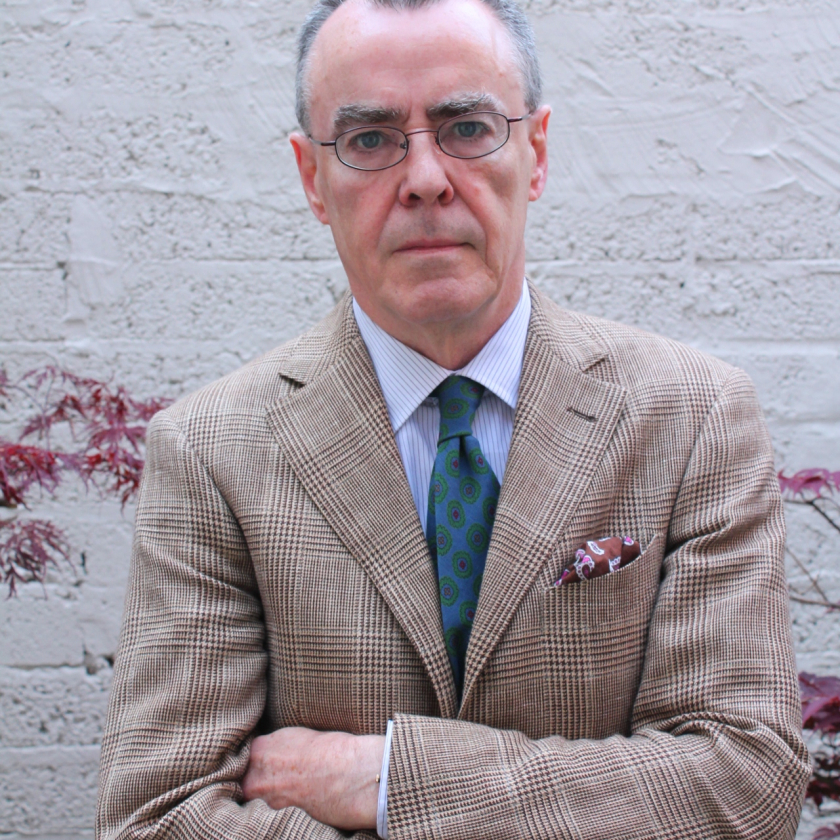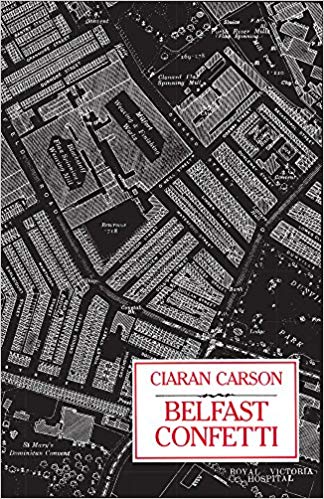I begin this humble essay on the day a writer was awarded the Nobel Prize for Literature who some feel was undeserving due to political opinions that are objectively monstrous. The writer in question spoke at the funeral of Slobodan Milošević, suggesting that we’d all given poor old Slobo too much grief for his war crimes. The writer (why am I being vague: Peter Handke) may have had his reasons for defending a monster, and maybe my view of Milošević is informed (as Handke believes) by an American perspective, and yeah, the Nobel committee is supposed to be apolitical and judge writers by their literary output, and sure, Handke likely deserves the award for his work, but. . . I still feel like maybe the award could’ve gone to a writer more deserving, one who—in addition to pushing genres and challenging conventions and promoting language and inventiveness and the asking of difficult questions—used their writing as a means of communicating what it means to be inside of conflict without overtly championing one side against another. And that writer, to me, was Ciaran Carson who died a few days ago, just shy of his 71st birthday.
Carson is most thought of as one of the Northern Irish writers who used the violence of The Troubles in his art. Which is true, but, damn, the guy did so much more than write a few poems about bombings. But those poems are a good way into the totality of Carson’s achievements. My favorite book of his, the one that introduced me to Carson, is Belfast Confetti, a direct reference to the nails, broken glass, and other fragments scattered throughout the streets of Belfast post bombing, though the phrase encompasses considerably more. Just read the book and you’ll see. What you’ll also see is a man grappling with everyday life lived alongside sectarian violence. And you’ll see some long lines of poetry that sprawl to the point where the reader is ready for the poems to fall apart. Miraculously, they don’t. What they do—the poems, as well as the prose pieces—is move through the mundane, the extraordinary, the darkly humorous and, of course, the tragic, all with an elegance that’s beyond enviable. Carson’s voice, especially in that collection, is inimitable, though that hardly stopped me from trying to be him. After Belfast Confetti made its way into my life, my own stabs at poetry were centered on the city of Chicago, much to the chagrin of my thesis advisor.
Reading the loving testimonials of Carson’s talent in The Irish Times, I see his publisher make the claim that Carson drew Belfast in literature as Joyce did with Dublin so many decades prior. Being a Joycean as well, is it any wonder I wanted to make my city the setting for my poems and stories? Though I cringe now at the “Chicagoness” of my past writing, I can’t help but see what Joyce and Carson did as instructive. Why not make this city—with all its beauty and ugliness, its violent crime and grand architecture, its cultural touchstones and deep segregation—the inspiration for my work? Didn’t Ulysses bring the epic to “dear dirty Dublin” and make an everyman its hero? Didn’t Belfast Confetti communicate the absurdity of terror in poetry? Yes I say yes (borrowing from Joyce here) but, of course, I’m no Joyce or Carson.
Please pardon my hero worship and self-deprecation, as well as my ambition. I merely wish to demonstrate the effect and influence Carson’s book has on yours truly. And now that the man I dubbed my favorite living poet is no longer living, well, I’m a bit saddened. Not to the extent that I’m in tears—I didn’t know the man—but sad like we get sometimes when a celebrity dies, that sort of wistfulness we can’t really justify. Regarding celebrities passing on, I have a friend who feels that anyone publicly airing their grief on social media is hijacking the death of a human being. Behind that is his belief that people may connect to the songs, books, films, speeches of that person, but to weep? Oh, c’mon. And I see his point, sort of. But to be moved by the death of a famous stranger is to admit a deep connection with their work. We likely don’t (or shouldn’t) react to every celeb who buys the farm, but the deaths of some—the ones that matter to us—do make us pause, reflect, maybe even tear up. I wasn’t happy that Prince died, but I never liked his music enough to do more than say, “That’s a shame” when he went the way of all flesh. David Bowie’s death, on the other hand. . . that wrecked me.
So yeah, Carson died and I can’t overly weep about it, and that’s not really what I’m trying to do here. But the news has made me put down whatever else I’m reading and pick up his selected poems, as well as his book The Star Factory, and immerse myself in his vision. I’m reminding myself why I put him so high on my list of greats, and why I often said his name in response to the question, “Who do you think should win the Nobel Prize for Literature this year?”
Honestly, I never expected Carson to win. If anyone had a shot this year, it’d might have been another Carson: Anne. But while thinking about Handke’s win, I have to wonder if Carson (Ciaran, though I’d put full weight behind Anne) might not have been a more defensible choice. Wait, might not have been? Jesus, he ABSOLUTELY would’ve been a better choice. For all his focus on The Troubles, Carson’s work never took a strong side in the sectarian war of Northern Ireland. I mean, he did, sorta, but the poems speak less to who was right and who was wrong and more to the greater tragedies, ongoing violence, and small details that, though they go overlooked when discussing such a subject, are necessary points toward concrete communication.
And, look: not every book was about The Troubles. The conflict seeped into the earlier works, but Carson was hardly a one-trick-pony. He explored smaller, more personal matters, left his mark on sonnets and other forms, ran with the long line style of C. K. Williams then clipped his poems to dazzling effect in Breaking News; for those of you who don’t like poetry (or don’t think you like it, which we can definitely talk about) he crossed into the memoir (The Star Factory), the novel (Shamrock Tea, top notch), essays (Last Night’s Fun, to name a great collection), and worked as a translator (I need to read his rendering of The Inferno, not to mention The Tain) even using his translations of Jean Follain as a springboard for his own poetic responses (From Elsewhere). What is evident through all his work is his devotion to language. Being raised in an Irish speaking house while engaging in an English speaking society likely offered Carson the opportunity to micro-focus on language, but whatever the case, his work consistently privileges language above all else.
A lesson from Carson: The writer has an ethical obligation to use the right word. Damn straight! Reading his poetry and prose, I am embarrassed at my falling short of the writer’s ethical obligation. I’d do well to write these words on the wall behind the computer where I make my stabs at literature.
Readers of The Soft Lunacy (and let me know if you want a copy) may already know of my admiration for Carson, as well as my brief encounters with the man. I flew to D.C. to see him talk and read his poems in 2007. Prior to the event, I’d emailed him to set up an interview. He seemed agreeable when writing me back, but when I asked him about it on the day, he declined to participate. Later, while getting books signed, he seemed put upon, like he just wanted the day over with. Not grumpy or unapproachable, but certainly not as willing to chat as Paul Muldoon, who was next to him doing a little dance. In 2016, I flew to Belfast to take part in a week of poetry writing hosted by Queen’s University. Carson taught the first class on haiku. That meeting went better—he responded positively to my in-class efforts, which put those voices screaming “FRAUD!” to bed.
One lesson that struck from that brief workshop: Writing is discovery. Rare is the project that is fully realized before it is composed. Or, to again paraphrase Carson, there’s nothing interesting about writing a poem that you know is going to a definitive place. Let the writing take you somewhere unexpected. Be open to it. It’ll be more sincere. I agree. While it certainly helps to have a plan, the plan is only an outline or rough idea—exploring it through writing is where the fun comes into play. Revising it for specificity of language is the last step.
A few hours after the workshop, I saw Carson standing alone outside a crowded room where he was to read some of his poems. I had a copy of Belfast Confetti with me. I thought it the right time to ask him to sign my book, maybe imagined he’d scribble a few nice words. But I froze. I didn’t want to bother him. I’d elevated him too much, and if there’s one thing I know it’s that the gods want to be left alone.
Back to where we began:
Carson is no longer eligible for the award that allegedly validates the entirety of a writer’s work. But we know the Nobel is bullshit, right? I mean, a million bucks and elevated book sales are nothing to sneeze at, but the idea of it—like all awards—is riddled with controversy and debate to the point where many of us have stopped caring (especially since Bob Dylan won). Still, if the award exists, and if the Swedes were truly concerned with steering away from scandal (which they claim they were), they would’ve chosen someone other than Handke. And while that might’ve been someone with the last name Murakami or Krasznahorkai, I would’ve proclaimed my hero as most deserving. Shifting away from his dedication to writing, and his contributions across genres and forms, neither in his work nor in his life did he commit a sin as egregious as Handke’s. In fact, one might argue (as I am) that his work made life better. It gave voice to experience beyond the understanding of most but all too familiar to many; it served as a reminder of the purpose and beauty of language; it provided an example of reinvention. I mentioned Bowie earlier as another celebrity whose death hit me hard. It strikes me now that I must value the artist who can find new ways of being, who does not rest on their laurels, and who interrogates their old work while spring-boarding from it to new places. Bowie reinvented himself throughout his career. Carson was not one to stay in the safe lane either. I have to assume that these artists were not tearing up the old and exploring the new frivolously, but that the journey toward the new was what interested them. As Carson stated, “Writing is about finding out.” And through his writing he showed us a lot.



